UNCTAD implemented the project “Building the Capacities of Developing Countries to Shift Towards Sustainable Freight Transport” under the 9th Tranche of the UN Development Account.
The project was aimed at strengthening the capacity of policy makers (in transport, infrastructure and finance), transport operators (in rail, road, and ports from public and private sector), and key financial institutions, in East Africa and the Caribbean to promote and finance sustainable freight transport through developing sound transport policy measures and adequate financing actions and mechanisms.
Sustainable freight transport entails the ability to promote sustainable transport policies, planning strategies, and investment decisions that balance the economic, environmental and social objectives. This is particularly crucial for developing countries that have the opportunity to consider from inception a sustainable path for transport development and to progress towards a sustainable, greener, low-carbon and more climate resilient development patterns and poverty reduction. Not only will this concept help improve energy efficiency, minimize exposure to high transport costs, and limit environmental and climate change impact, it also provides an opportunity to redirect resources to tackle other persistent challenges, such as lack of efficient and reliable transport infrastructure and logistics services. However, for most of developing countries, bringing about this shift is difficult, given the absence of well-articulated supporting measures and requisite resources and finance.
The project included three components:
- Preparing a toolkit featuring training and reference material, and case studies on sustainable freight transport development and finance, including specific models of Public Private and Partnerships (PPPs);
- Preparing and delivering a set of training and information/experience sharing activities on how to promote and finance the development of sustainable freight transport through regional workshops and a web-based platform;
- Assisting in the formulation of suitable freight transport strategies and finance mechanisms to two selected requesting countries (one in East Africa and one in the Caribbean), delivered through training and advisory services.
The project was implemented in two regions: sub-Saharan Africa and the Caribbean.
Building capacities of stakeholders in the two regions is critical as their freight transport activities are growing substantially in tandem with economic development, and transport systems are increasingly being developed. They can learn more about successful sustainable transport policies and finance practices developed in the region as well as in other parts of the world and avoid running into some common pitfalls.
UNCTAD was solely responsible for implementing the project and sought to cooperate with relevant partners and relevant UN sister organizations as appropriate, including the United Nations Environment Programme (UNEP), the United Nations Development Programme (UNDP), and the regional commissions in particular the Economic Commission for Latin America and the Caribbean (UNECLAC) and the Economic Commission for Africa (UNECA).
All materials developed under the project have been made available to all countries in all regions as appropriate, ensuring long term sustainability and the widest possible coverage.
Outputs:
- The UNCTAD Sustainable Freight Transport Framework
- UNCTAD Sustainable Freight Transport and Finance Training Toolkit



